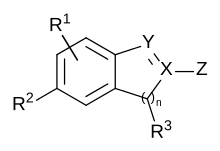Chemical patent
A chemical patent, pharmaceutical patent or drug patent is a patent for an invention in the chemical or pharmaceuticals industry. Strictly speaking, in most jurisdictions, there are essentially no differences between the legal requirements to obtain a patent for an invention in the chemical or pharmaceutical fields, in comparison to obtaining a patent in the other fields, such as in the mechanical field. A chemical patent or a pharmaceutical patent is therefore not a sui generis right, i.e. a special legal type of patent.

| Patent law |
|---|
| Overviews |
| Basic concepts |
| Patentability |
| Additional requirements |
| By region / country |
| By specific subject matter |
| See also |
|
In the pharmaceutical industry, the patent protection of drugs and medicines is accorded a particular importance, because drugs and medicines can easily be copied or imitated (by analyzing a pharmaceutical substance) and because of the significant research and development spending and the high risks associated with the development of a new drug.[1][2][3]
Chemical patents are different from other sources of technical information because of the generic, Markush structures contained within them, named after the inventor Eugene Markush who won a claim in the US in 1925 to allow such structures to be used in patent claims. These generic structures are used to make the patent claim as broad as possible.
In the United States, patents on pharmaceuticals were considered unethical by the medical profession during most of the nineteenth-century.[4] Drug patent terms in the US were extended from 17 to 20 years in 1994.[5]
See also
References
- Oliver Gassmann, Gerrit Reepmeyer, Maximilian von Zedtwitz, Leading Pharmaceutical Innovation, Trends and Drivers for Growth in the Pharmaceutical Industry, Springer, 2008, ISBN 3-540-77635-4, ISBN 978-3-540-77635-2, pages 133-134.
- Scherer FM., The economics of human gene patents Archived April 25, 2012, at the Wayback Machine, Acad Med. 2002 Dec;77(12 Pt 2):1348-67 : "
- For one, in pharmaceuticals, as in organic and agricultural chemicals, patent claims tend to define products especially precisely. ...
- Second, once a particular molecule is identified as a potentially effective therapeutic medium, it must be carried through expensive clinical trials to prove its safety and efficacy. ...
- Third, absent patent protection or regulatory barriers to imitation, imitators might spend a very few million dollars on product formulation, process development, and clinical trials (typically on 24 human subjects) required to prove therapeutic equivalence and bring their generic substitutes onto the market in competition with the company that has incurred huge discovery and clinical testing costs. ...
- "... patents are key in the pharmaceutical sector, as they allow companies to recoup their often very considerable investments and to be rewarded for their innovative efforts" in European Commission, Pharmaceutical Sector Inquiry, Preliminary Report (DG Competition Staff Working Paper), 28 November 2008, page 5 (pdf, 1.95 MB).
- Gabriel, Joseph (2014). Medical Monopoly: Intellectual Property and the Origins of the Modern Pharmaceutical Industry. University of Chicago Press. ISBN 9780226108186.
- "Milestones in U.S. Food and Drug Law History". U.S. Food and Drug Administration. Retrieved August 11, 2019.
Further reading
- European Commission, Pharmaceuticals, Sector Inquiry, 2008 (Public Consultation, Preliminary Report).
- "Patents and Pharmaceuticals", a paper given on 29 November 2008 at the Presentation of the Directorate-General of Competition's Preliminary Report of the Pharma-sector inquiry, by the Rt. Hon. Sir Robin Jacob
- India wins landmark patent battle, BBC News, March 9, 2005
- "HIV/AIDS, Patents and the TRIPS Agreement: Issues and Options", United States Congressional Research Service, July 27, 2001
- "Pharmaceutical Patent Term Extensions: A Brief Explanation", United States Congressional Research Service, January 31, 2002
External links
- Patent Opposition Database, an online resource launched by Doctors without Borders as "a tool which can be used to explore how to challenge unfair patents and their negative impact on access to medicines." ("About". Patent Opposition Database. MSF Access Campaign. Archived from the original on 2012-10-07. Retrieved October 13, 2012.)